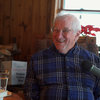Board members question meeting on streambed
WESTERLO — Two town board members objected last week to a special meeting of the other three, who voted to enter into an agreement with federal and state agencies that will fully fund stream restoration along Route 143.
“I didn’t receive two days’ notice for that meeting, which is required, so that meeting’s not legit,” Councilman Theodore Lounsbury said as the board voted through the minutes at the regular meeting of the town board on Feb. 4. He said an e-mail about the meeting came to him one day before; Councilman Alfred Field said he didn’t know until the day of the meeting.
“So what you’re saying, that’s an illegal meeting?” Supervisor Richard Rapp asked Field and Lounsbury, who affirmed.
William Bichteman, Anthony Sherman, and Rapp met on Jan. 14 to authorize Rapp to enter into an agreement with the National Resources Conservation Service, a branch of the federal United States Department of Agriculture, and the Albany County Soil and Water Conservation District.
The original proposal was rejected by Rapp, Bichteman said during the February meeting, for costing the town money. Several months passed, he said, before NRCS said it was able to cover additional costs.
“They came back and met with Ed Lawson and myself,” Bichteman said of the code enforcement officer, “not as a town board member, but as the adjacent property owner on the other side of the street, to find out if I would grant an easement to come across that field.” Bichteman said he agreed to the easement and that there would be no financial gain for him with the current project.
Bichteman rejected the notion that a derelict private property was being revived with tax dollars.
“The potential is that that property would become a situation that the town would have to deal with sooner or later,” said Bichteman. “Secondly, it’s another piece of property in the town that already has a dwindling population that would not have a tax base any longer.”
Joseph Slezak, a field manager at the Albany County Soil and Water Conservation District, told The Enterprise the total estimated cost of the project is $257,000, with $68,000 coming from state funds and the rest from the federal government.
The NRCS District Conservationist familiar with Westerlo’s project, Eric Swanson, could not be reached on Wednesday. The project is part of the Emergency Watershed Protection Program of NRCS.
William VanDevalk, an engineer for NRCS Schoharie, said federal funds for the Emergency Water Protection Program have deadlines, which have often required communities to act quickly in applying for extensions.
“The EWP structures, by law, the work is supposed to be done within 220 days of when the state gets the money,” said VanDevalk. “The thinking being, until New York State NRCS knows they have the money, we can’t expect sponsors to move forward with anything.”
“We had to do it right then and there, so we did it,” Rapp said after the Feb. 4 meeting, adding that the town got a good deal.
He said a legal notice had been sent to The Enterprise. “Of course, by the time anybody read it, the meeting was over,” said Rapp. In fact, no Jan. 14 meeting appeared in a legal notice from the town when the next issue of the newspaper was published on Jan. 16. One Westerlo notice indicated that the work meetings scheduled on the second Tuesday of each month had been discontinued.
The meeting minutes were available at the Feb. 4 meeting and state that a notice was posted on the town’s sign board and on its website.
The state’s Open Meetings Law allows public bodies to schedule a meeting within a week’s time by giving public notice of it to the news media “to the extent practicable” and posting a notice in a designated public place “at a reasonable time prior thereto.” It does not require publication of a legal notice.
Whether or not a meeting can be scheduled less than a week in advance depends on the urgency of holding it, said Robert Freeman, director of the state’s Committee on Open Government.
The state’s Town Law, Section 62, allows for a supervisor to call a special meeting with at least two days’ notice to other members of the board.
The town is the municipal sponsor of the restoration project but is not expected to spend any money. The project is required to stabilize the streambed. Its bank is badly eroded following tropical storms Irene and Lee in August 2011.
The NRCS funds emergency watershed protection projects up to 75 percent. Typically, local funds, or municipal sponsors, are supposed to come up with the other 25 percent. After the tropical storms Irene and Lee, the state has put forward emergency money to cover the local portion.
The project’s scope could change as it’s designed, Slezak said, but it is planned to have stacked rocks at the bottom of the steep embankment, with large boulders, called rip rap, above. Live willow shrubs will be planted throughout the boulders to further stabilize the soil, he said.
“We’re very interested in it because of the water-quality protection,” said Slezak. “You have a bridge that could go out, you have the drinking water down to Albany. It’s a classic watershed protection.”
The Basic Creek that runs through the hamlet leads into the Basic Creek Reservoir, a supplement to the Alcove Reservoir, the city of Albany’s supply of drinking water.
“Erosion is a natural process, but, when it’s excessive, it can cause havoc,” Slezak said. “Trout like pools, and ripples, and cold water. So, if you get a lot of sediment in there you might have shallow sections of stream corridors.”


